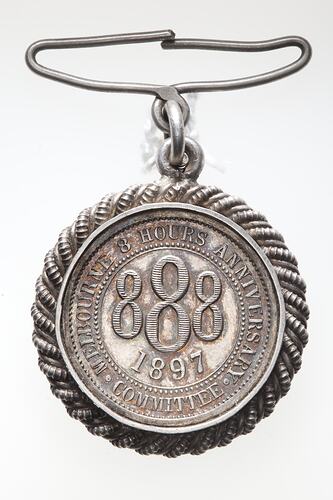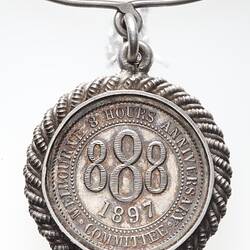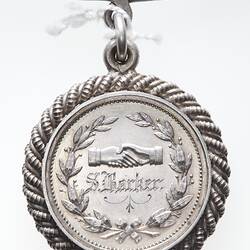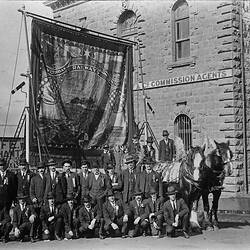Summary
Medal awarded by the Melbourne Eight Hours Anniversary Committee to Stephen Barker in 1897. Barker at the time was president of the Trades Hall Council and a member of the Eight Hours Committee.
Action taken by stonemasons on 21 April 1856 led to the establishment of the Eight Hour Day, with the government agreeing that workers employed on public works should enjoy an eight hour day with no loss of pay. It was a world first and became emblematic of the rights of labour. In recognition of the significance of this achievement, April 21 was made a public holiday in 1879 and commemorative marches were held each year from 1879 until 1951. The Eight Hour Day holiday was renamed Labour Day in 1934. In 1955 the Labour Day march and celebrations were replaced by Moomba celebrations.
Physical Description
Silvered copper medal with braid surround and attachment for ribbon.
Obverse Description
888/1897/8 HOURS ANNIVERSARY COMMITTEE MELBOURNE
Reverse Description
S. Barker.
Significance
Stephen Barker (1846-1924) was a leader of the labor movement in Victoria. A clothing trade worker, he was president of the Pressers' Society from 1894, Secretary of the Victorian Trades Hall Council 1897-98, a member of the Eight Hours Day Committee 1896-98, and Secretary of the Trades Hall Council 1901-1910. In 1910 he was elected to the Senate, defeated in 1919 and reelected in 1922.
This medal was presented to Barker as a member of the Eight Hours Day Committee.
Eight Hour Day:
On 21 April 1856, following negotiations between building tradesmen and contractors, and with the approval of the colonial government, an eight hour day was introduced into the building trades in Melbourne. The movement was led by the stonemasons who argued that eight hours a day was appropriate in the Australian heat. It would also give them time to improve their 'social and moral condition'.
Two employers, with substantial contracts for public buildings at the Western Market and Parliament House, resisted the new working hours agreement. In response to their intransigency, the stonemasons lead a protest march from University of Melbourne to Parliament House, calling out workers at building sites on the way. Within a fortnight the contractors had given way.
The worker's achievement established a national and international standard to which working people everywhere could aspire. It was widely celebrated as a world first and formed the basis of Australia's reputation as a 'workingman's paradise'.
However, only a minority of workers initially won the Eight Hour Day. Most workers, including women and children, generally worked longer hours for less pay. It was still common to work twelve to sixteen hours a day.
It wasn't until 1873 that the Victorian government passed regulations to improve working conditions. The legislation gave female factory workers the Eight Hour Day and was intended for 'the benefit of those who cannot defend or protect themselves'.
By the 1880s, thousands of people turned out for the marches that commemorated the winning of the Eight-hour Day.
More Information
-
Collecting Areas
-
Acquisition Information
Purchase
-
Date Issued
1897 AD
-
Issued By
Melbourne Eight Hours Anniversary Committee, Melbourne, Victoria, Australia, 1897
-
Awarded To
Stephen Barker, Melbourne, Greater Melbourne, Victoria, Australia, 1897
-
Inscriptions
Obverse: 888/1897/8 HOURS ANNIVERSARY COMMITTEE MELBOURNE Reverse : S. Barker.
-
Material
Silvered Copper
-
Classification
-
Category
-
Discipline
-
Type of item
-
Object Measurements
50 mm (Length), 35 mm (Width), 5 mm (Height)
-
Diameter
33 mm (Outside Diameter), 18.64 g (Weight)
-
Shape
Round with loop
-
References
'Stephen Barker', in Australian Dictionary of Biography, v.7, 1979
-
Keywords
8 Hours Day Celebrations, 8 Hours Day Movement, Trade Unions, Working Life, Workers Rights, Making History - Eight Hour Day



